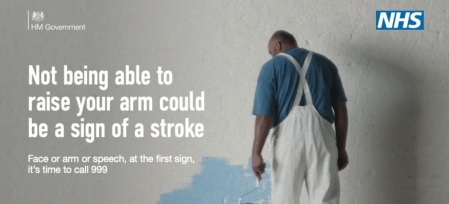
Tens of thousands of people who have a stroke could be diagnosed and treated sooner as new data found that the average time between the onset of first symptoms and a 999 call being made was nearly an hour and a half.
A stroke is a medical emergency that requires immediate attention as every minute is vital. Acting FAST on any sign of a stroke gives stroke patients quicker access to specialist treatment that can be life-saving and could reduce the long-term effects such as a disability.
A stroke strikes every five minutes. Every year in the UK, there are around 100,000 strokes, causing 38,000 stroke-related deaths, and it is a leading cause of disability.
The first sign of a stroke might not seem serious. Like not being able to raise your arm, or struggling to smile, or slurring when you speak.
Stroke symptoms can be less dramatic, painful or obvious than you might expect. Even if it doesn’t seem like it, any sign of a stroke is always an emergency, so call 999 immediately if you or someone else experiences a single symptom.
Whether it is a friend, loved one or even a passer-by, dialling 999 quickly saves lives.
Face or Arm or Speech, at the first sign, it’s Time to call 999.
New analysis of NHS data shows that for 2023-24, of 41,327 patients with a recorded time of symptom onset, the average time between the first symptom and a 999 call being made was 88 minutes.
A new poll of 2,001 adults in England found that 57% of respondents believed you should have 2-3 symptoms of a stroke before calling 999, despite just one being a sign of a medical emergency.
Nearly two-thirds of respondents (64%) said they would not call 999 as their first course of action if they noticed someone was suddenly struggling to smile.
Cathy Winfield, Chief Nursing Officer at NHS South Yorkshire said: “Stroke is the fifth leading cause of death in South Yorkshire and is sadly more common in our region than in many other parts of the country.
“A stroke can happen to anyone at any age, but those at increased risk include people aged over 50 years old, people from a Black or South Asian background, or those living with existing conditions such as high blood pressure and diabetes.
“If you notice symptoms of a stroke – facial droop, arm or leg weakness or speech difficulty, seek urgent help and dial 999 immediately. When you act FAST and get urgent help, you can receive life-saving and brain-saving treatment quickly.
The NHS campaign launches with a brand new TV advert showing example symptoms – a man recognising his partner is struggling to smile while watching TV (Face), a decorator suddenly unable to lift their paint roller (Arm), and a grandmother struggling to read their grandchild a bedtime story (Speech) – which will run across TV, TV on demand and radio in England until mid-December.
As part of the campaign launch, a powerful new film has also been released which features stroke survivors listening back to audio recordings of the real 999 calls that saved their lives, which you can watch here.